- [email protected]
- (650) 338-8226

Cupertino, CA

- Our Philosophy
- Our Results
- News, Media, and Press
- Common Application
- College Application Essay Editing
- Extracurricular Planning
- Academic Guidance
- Summer Programs
- Interview Preparation
Middle School
- Pre-High School Consultation
- Boarding School Admissions
College Admissions
- Academic and Extracurricular Profile Evaluation
- Senior Editor College Application Program
- Summer Program Applications
- Private Consulting Program
- Transfer Admissions
- UC Transfer Admissions
- Ivy League Transfer Admissions
Graduate Admissions
- Graduate School Admissions
- MBA Admissions
Private Tutoring
- SAT/ACT Tutoring
- AP Exam Tutoring
- Olympiad Training
Research Programs
- Science Research Program
- Humanities Competitions
- Passion Project Program
- Ad Hoc Consulting
- Athletic Recruitment
- National Universities Rankings
- Liberal Arts Colleges Rankings
- Public Schools Rankings
Acceptance Rates
- University Acceptance Rates
- Transfer Acceptance Rates
- Supplemental Essays
- College Admissions Data
- Chances Calculator
- GPA Calculator
National Universities
- College Acceptance Rates
- College Overall Acceptance Rates
- College Regular Acceptance Rates
- College Early Acceptance Rates
- Ivy League Acceptance Rates
- Ivy League Overall Acceptance Rates
- Ivy League Regular Acceptance Rates
- Ivy League Early Acceptance Rates
Public Schools
- Public Schools Acceptance Rates
- Public Schools Overall Acceptance Rates
- Public Schools Regular Acceptance Rates
- Public Schools Early Acceptance Rates
Liberal Arts
- Liberal Arts Colleges Acceptance Rates
- Liberal Arts Colleges Overall Acceptance Rates
- Liberal Arts Colleges Regular Acceptance Rates
- Liberal Arts Colleges Early Acceptance Rates

Why Should You Join the Model United Nations (MUN)

By Eric Eng

Why Should You Join Model United Nations (MUN)
The Model United Nations started in 1927 before the UN even existed. At that time, the program was known as the Model Assembly of the League of Nations, and keynote speakers such as Eleanor Roosevelt and UN Secretary-General Kofi Annan amplified the presence of the program.
It eventually grew to its current popularity with over 5,000 students attending conferences each year. Conferences are typically staffed by UN Secretariat members and faculty from top universities like Harvard , Yale, and Georgetown.

When is the 2025 Model United Nations?
Model United Nations members have the opportunity to participate in national conferences held in three different locations. The first set of conferences will take place in New York City from April 6-10 and April 13-17, 2025.
Another conference will be held in Washington, D.C., from November 8-10, 2024.
There is also a conference scheduled in San Cristóbal Island, Galápagos, Ecuador, from November 22 to December 1, 2024. These conferences provide Model United Nations participants with valuable experiences in discussing and negotiating challenging global issues, simulating the real United Nations environment where delegates represent the perspectives of their assigned countries or organizations.
Model United Nations or National Speech
You’ll learn how to delegate important and critical issues currently facing the world, such as internet privacy, artificial intelligence, debt sustainability, combating human trafficking, or combating climate change.
You’ll collaborate with diverse and socially conscious students who are also seeking to empower themselves with hands-on educational experience. Being a Model United Nations member will help you in your goals of changing the world, and allow you to understand the difficult nature of compromise even within a simulated environment.
Perhaps changing the world isn’t necessarily on your agenda, but joining a well-researched debate is what intrigues you about the Model United Nations? Then consider joining the National where you can go head-to-head in debates and speeches across the country in pulse-racing competitions with other high school students.

During competitions, you will argue for or against a strong debatable issue in front of an audience. Categories range from world, policy, congressional, and public forum debate and the current topic for the national policy debate competition is criminal justice reform.
Prior topic areas range from debates about whether the US should withdraw from the Afghanistan peace process, and if the United States should end its economic sanctions against Venezuela, to subjects such as if the United States should replace means-tested welfare programs with a universal basic income. If you are the type of person who would typically be debating these types of subjects with families or friends during a meal, then the National might be the perfect community for you.
Members compete in competitions that draw on their speech and writing skills to develop commentaries, read dramatic monologues, craft original speeches, and present plays and short stories that are humorous or educational. You can view all competitions and events being held this year by the National and learn how to do things such as control time limits or speak more elegantly, from past debate and speech competitors.
Former Students of Model United Nations
Past alumni of the National include high school students like 17-year-old Wolf Cukier, who recently helped scientists discover a planet during an internship he secured with NASA shortly after winning at nationals. There’s also Joanna Bai, another finalist of the debate and speech competition who found the courage to speak up as an advocate for her friend with Down Syndrome by founding a non-profit called Special Musicians, a music program for kids with disabilities to express themselves through music.
Or Saskia Reford, whose debate team lost two members due to suicide, so she convinced other teams to use money that would normally be given for trophies to support mental health programs in high schools. Even television superstar Jared Padalecki from Smallville and Gilmore Girls was a 1998 Champion of the National Speech and Debate Association Duo Interpretation competition.
No matter where these competitions take you, they will be sure to deepen your interest and curiosity in understanding what position you take on some of the world’s most challenging topics. Plus, competitions like these will make you a better communicator of your future goals when college essay and interview season comes around.
Benefits of joining Model United Nations
Now that you have a strong understanding of what Model United Nations is and what it means for current and former members, you may be interested in gaining a greater understanding of what it actually offers students who get involved through the experiences that it takes members down.
Without a doubt, joining highly competitive and established groups such as Model United Nations comes with a certain amount of prestige for students. However, that level of prestige is simply scratching the surface when it comes to what students get out of it. Let’s break down the top benefits of joining Model UN:
1. Students learn how to problem-solve as a member of a team. In Model UN, you act as a country representative in the United Nations, dealing with real problems like climate change, human rights, and international conflicts. This experience teaches you to think methodically, consider various perspectives, and negotiate with others to find common ground. These simulations boost your confidence in handling big issues. This confidence also helps you manage and solve everyday problems and anxieties.
2. Students gain worldly knowledge. As a delegate, you must research and analyze your assigned country’s foreign policy and global role. For example, representing Brazil in MUN means studying its participation in international organizations, stance on climate change, diplomatic relations, economic policies, and more.
Similarly, if you represent Japan, you would explore its technological advancements, post-WWII pacifist policies, regional security, disaster relief efforts, and balance between tradition and innovation. Through MUN, you engage more effectively in discussions, understand diverse viewpoints, and contribute thoughtfully to solving international challenges.
3. Students gain important analytical skills. When going from high school to college, students often are surprised by where the emphasis is when it comes to their learning. While memorizing and fact-gathering is often most important in high school, in-depth analysis becomes increasingly important in high school, grad school, and beyond. For that reason, students would be wise to consider the fact that Model UN prepares them for that analysis-heavy workload.
4. Students build confidence and public speaking skills. One major concern for children these days is that they are losing important opportunities to speak publicly and gain confidence in social situations. This is partially due to the fact that learning – and socializing – have become increasingly linked to technology. Luckily, Model UN serves as a great way for high school students to get out into the world, engage with students and grown-ups alike, and even get some important experience when it comes to presentation and public speaking.

5. Students learn about the power of negotiation. Diplomacy and negotiation are at the heart of Model UN. Just as one country will have to negotiate with another in order for both to be happy during Model UN, so too will a high school student one day have to negotiate with another individual, business, or other entity once they enter the professional world. Through Model UN, students will become much more knowledgeable and experienced in how to conduct negotiations between two groups in a mature and result-driven manner.
6. Students get an opportunity to lead. One of the most important things for students to do in high school when it comes to getting into the college or university of their dreams is to take on leadership roles. In Model United Nations, students literally role-play being a world leader and coming to agreements and compromises that will impact millions – if not billions – of human lives. That allows those students to continuously work on and improve their own leadership abilities.
7. Students get the chance to network with peers and mentors. Students who attend Model UN get access to an ideal way to network with and make friends with like-minded peers and potential mentors. During a Model UN event, students will be meeting with other delegates, senior delegates, judges, organizers, sponsors, and chairs of the given event. This can lead to a lot of new contacts that will want to keep in touch with one another long after the Model UN event ends.

Final Thoughts
Joining Model United Nations brings many benefits that go well beyond just enjoying debates and diplomacy. It’s a great investment in your future, giving you the skills, knowledge, and confidence to succeed in a global environment. Through debates, research, and working together to solve problems, MUN participants learn a lot about world issues and how to handle complex situations. The experiences and connections you make in MUN can lead to exciting educational and career opportunities, making it a worthwhile activity for any student wanting to make a difference in their future. Join Model United Nations and start on the path to becoming a leader in your chosen field!
Frequently Asked Questions
1. What skills can I develop by joining Model United Nations?
Joining MUN helps you enhance crucial skills such as diplomacy, negotiation, critical thinking, compromise, public speaking, writing, and research. These skills are invaluable for college interviews, professional settings, and many future career roles.
2. What are the benefits of participating in MUN conferences?
Participating in MUN conferences at locations like the UN Headquarters allows you to engage in discussions and negotiations on global issues, simulating a real UN environment. This exposure is beneficial for understanding international relations and developing a global perspective.
3. How often and where are national MUN conferences held?
National MUN conferences are held annually in multiple locations including New York City, Washington, D.C., and internationally in places like the Galápagos Islands. Specific dates and locations vary each year, offering flexibility and diverse experiences for participants.
4. Who typically attends MUN conferences?
MUN conferences attract over 5,000 students yearly and are staffed by UN Secretariat members and faculty from prestigious universities such as Harvard , Yale, and Georgetown. This provides a unique networking opportunity with knowledgeable professionals and like-minded students.
5. How can participating in MUN benefit my college applications?
Being part of MUN boosts your extracurricular profile and demonstrates your commitment to leadership, global issues, and teamwork. Such experiences are highly valued by top universities and can significantly enhance your college applications.
Want to assess your chances of admission? Take our FREE chances calculator today!

Why College Admissions Isn’t Perfect

US News Rankings

The Personal Statement: The Holy Grail of College Admissions

The Modern Day 4.0 and 1600 SAT Score Student Is No Longer Impressive

The Competitive Nature of College Admissions for Asian Americans

The College Application

Our Comprehensive Approach

Ivy League Schools

How Early Should You Prepare for College?

Featured in US News & World Report Best Colleges Publication

Congratulations to AdmissionSight Students and their Acceptances!

College Rejection

College Rankings

College Consultants Could Make A Difference

College Admissions Scandal and Higher Education

10 Easiest College Classes For A Stress-Free Semester

5 Factors to Consider Before Choosing Your Dream Study Destination

Where is Wesleyan University Located?
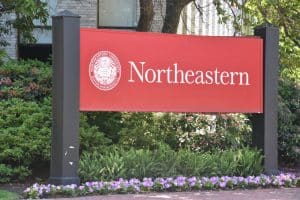
Where is Northeastern University located?

Where Is Amherst Located?

Top Extracurricular Activities for Ivy Leagues
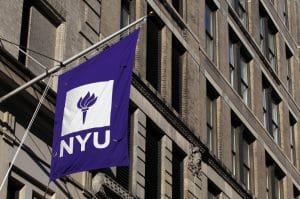
Where is NYU located?

Where Is Williams Located?

Where is Boston University Located?

Where Is Barnard Located?

Top 10 Undergraduate Business Programs

Where is Claremont McKenna Located?
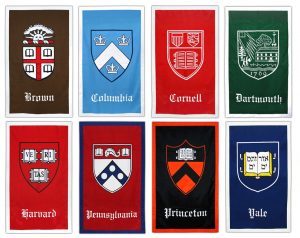
Ivy League Rankings 2024

10 Humanities Programs for High School Students

Where is Georgia Tech located?

How to Qualify for National Merit Semifinalist 2025
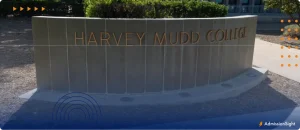
Where Is Harvey Mudd Located?
Leave a comment cancel reply.
Your email address will not be published. Required fields are marked *
Save my name, email, and website in this browser for the next time I comment.
Recent Articles

10 Easiest College Classes For...

5 Factors to Consider Before...

Top Extracurricular Activities for Ivy...

Sign up now to receive insights on how to navigate the college admissions process.

Admissions Counseling
- Academic & Extracurricular Profile Evaluation
Copyright © AdmissionSight 2024
Privacy Policy - Terms and Conditions

Choose Your Test
- Search Blogs By Category
- College Admissions
- AP and IB Exams
- GPA and Coursework
What Is Model UN? 4 Reasons to Join
Extracurriculars
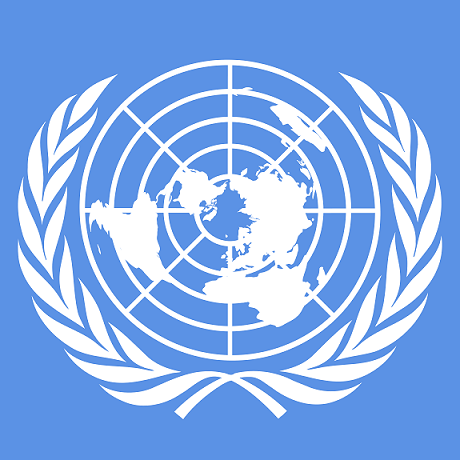
Are you interested in politics or international relations and looking for a club that lets you do you hands-on activities? Have you heard of Model UN but aren’t sure exactly what it is?
Read this guide to learn everything you need to know about what Model UN is, what participants in it do, and how to decide if it’s the right extracurricular for you to join.
What Is Model UN?
Model United Nations, often referred to as Model UN or MUN, is an extracurricular most commonly for high school students, but also available to college and middle school students.
Model UN is a simulation of UN organizations such as the UN General Assembly, UN Security Council, UNICEF, and others. Its participants take the roles of ambassadors from various countries and debate current issues. Model UN was developed in the 1950s as a way to give students hands-on learning in international relations, diplomacy, and the United Nations. Over 400,000 students around the world participate in Model UN each year.
What Do Model UN Participants Do?
The core of Model UN is its simulations of UN conferences where students (known as Model UN delegates) role play as UN ambassadors and delegates. If you join Model UN, you will be doing a variety of activities, including researching, debating, and coming up with solutions with members of other countries. These simulations occur at Model UN conferences, which can be regional, national, or international. Conferences can have anywhere from 30 to over 3,000 participants.
When your Model UN team joins a conference, your team will be assigned a country and an issue relevant to that country that is currently being discussed in the UN. You can request a certain country, but you are not guaranteed to get it. For example, you may be chosen to represent Nicaragua at the Economic Commission for Latin America and the Caribbean (ECLAC). At the conference you attend, you will have to convince the other delegates to make decisions in your country’s favor.
If you have a larger Model UN team, you may be assigned multiple countries or issues, and the team will break into smaller groups to cover each one. Conferences occur throughout the year, but you will be given at least a few weeks, and usually several months, to prepare your position before you attend the conference.
Before the Conference:
In order to prepare for conferences, delegates must study the country and the issue they have been assigned and become well-informed on both. Most conferences require you to write a position paper that outlines your country’s position on the topic as well as suggestions you have for how to resolve the issue.
If you’re representing Nicaragua for the ECLAC, you will need to research topics such as what sectors have the largest impact on the country’s economy, long-term and short-term economic trends in Nicaragua, if there are groups largely excluded from contributing to the economy (such as women or certain ethnic groups), who Nicaragua’s primary trade partners are, what the country imports and exports, and multiple other topics. After discussing these issues in the position paper, you will have to come up with ways to improve Nicaragua’s economic situation.
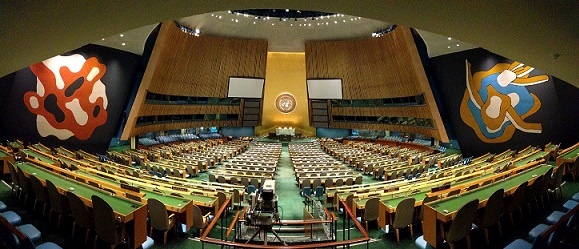
UN General Assembly Hall in New York City
During the Conference:
Students will be organized based on the committees or councils they are part of, so all the members of the ECLAC would meet together. Each group will have a chair who will moderate the discussions. The chair is often an older student or adult.
Delegates then give a speech outlining their country’s position on the issues and offering possible solutions. Most of this information will come from your position paper. After each delegate has presented their country’s position and potential solutions, there are question and answer sessions and debates (known as “caucusing”).
The main goal during the conference is for your committee to develop a written resolution. After you have discussed different countries’ viewpoints, debated, and agreed on solutions, the entire group will work together to write the resolution. The resolution will explain the issue your committee is focusing on and give a series of guidelines in order to solve it.
After the resolution is written, the committee will vote on it. If your resolution passes, that is a mark of your committee’s ability to work together and compromise well. Awards are also often given out at conferences to top delegates in each committee. These are often delegates who had well-designed position papers, debated effectively, worked well with other members, and took an active role in developing the written resolution.
How Can You Start a Model UN Group at Your School?
If your school already has a Model UN group, you can probably join it the way you would join any other school club.
If there is no Model UN club at your school, then you can also start your own. We have a guide that gives step-by-step instructions on how to start your own club , and we also have some specific tips for starting a Model UN club below.
First, you’ll need a teacher to act as the adviser for your Model UN club. When you apply to start a Model UN team, your school may assign a teacher, but, if not, consider asking a social studies teacher who likely has a strong background in the issues that Model UN discusses.
After you have recruited members and set up meeting times, the next step is to choose which conference(s) to attend. Currently, over 400 conferences take place all over the world. You can search online for conferences, and a list of larger conferences is also available here. For new clubs, you may want to choose a conference that is close to your school in order to make traveling easier and less expensive.
It’s possible for a Model UN team to sign up for multiple conferences, but if your team is just starting out, you may want to begin with only one or two conferences a year to make sure members aren't overwhelmed with work. Also, because new teams usually don't get first pick for what country they'd like to represent, if you'd like to represent a larger country like China or the US, you have a better chance of getting your first choice at a smaller conference. Be aware though that representing a larger country often requires more research and preparation.
Once you have a conference selected, your team will be assigned at least one country and committee to represent. You can now divide up roles and begin researching.
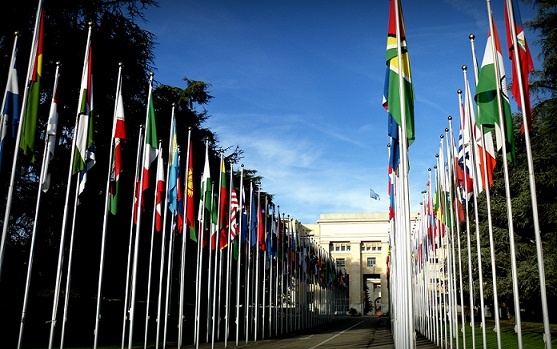
What Are the Benefits of Joining Model UN?
Now that you know what Model UN is, what are the benefits of joining it? Model UN can be a great addition to a resume or college application, and I've discussed four of its most important benefits below.
Benefit #1: Hands-On Experience in Politics, International Relations, and Current Events
If you are planning a career in international relations, politics, or you’re simply really interested in these topics, Model UN is one of the best extracurriculars you can join because it gives you hands-on experience in these areas. Most of the time, students interested in these subjects can only learn about them in class or by reading on their own. While this is a great way to get more information, it usually isn’t a very interactive experience.
Model UN involves many of the same activities that actual UN delegates participate in, which is a great way to learn how different countries and committees work together to solve problems. Model UN conferences also focus on current issues, so you will be learning about relevant current events that are likely being discussed and debated around the world.
Hands-on experience can make understanding ideas and concepts easier, looks stronger on college applications because it requires more work, and is often more fun to participate in as well.

Benefit #2: Improve Public Speaking and Debate Skills
During a Model UN conference, you will spend a lot of your time giving speeches and debating with other delegates, which can really improve your skills in these areas.
Public speaking and debate skills are useful for almost every career, so no matter what kind of job you want in the future, boosting your skills in these areas will likely benefit you down the line.
Benefit #3: Learn Teamwork Skills
Every step of Model UN requires teamwork, whether it’s dividing up research assignments, writing a position paper, or creating a speech. At the conference, teamwork becomes even more important because you must work with the other delegates to come up with solutions that everyone is happy with and write a resolution paper together.
Model UN delegates often gain experience in conflict resolution, consensus building, and negotiations, which are teamwork experiences many other clubs don’t offer.
Strong teamwork skills are very important to colleges because they want to admit students who will work well with their classmates and other students on campus. Having strong teamwork experiences such as the ones you can get through Model UN can help strengthen your college applications.
Benefit #4: Possibility of Travel
If you participate in Model UN, there is also the possibility of traveling to new cities or even new countries. Model UN conferences are held around the world, and if your team can afford to travel to a foreign conference, you can get the added benefits of exploring a new place and culture, as well as meeting students from other countries.

If you join Model UN, you may get to travel to some exciting places for conferences.
So should you join Model UN? If you have enough time in your schedule and are at all interested in international relations, politics, debating, or public speaking, then Model UN can be a great extracurricular to get involved in because it includes a lot of hands-on, relevant work and can be a strong addition to college applications. If you're still unsure, drop by a meeting at your school to get a sense of what joining the club would be like.
- Model UN is a club for middle school, high school, or college students whose members simulate UN committees.
- Model UN members are assigned at least one country and committee. They research the country and the relevant issues to prepare for a conference.
- At the conference, students representing many countries and issues come together to debate their positions and agree on solutions.
- Model UN is a great extracurricular for students looking to learn more about politics, current events, or international relations and for students who want to improve their public speaking or debate skills.
- You can learn more about Model UN here.
What's Next?
Looking for other after-school activities? We have a list of over 200 extracurricular ideas , and it's sure to include something that interests you!
Considering community service or volunteer work? We have a guide to the nine best places to do community service!
Interested in more opportunities for travel? Read our guide on volunteer abroad programs and learn if they're really the best option for you.

Trending Now
How to Get Into Harvard and the Ivy League
How to Get a Perfect 4.0 GPA
How to Write an Amazing College Essay
What Exactly Are Colleges Looking For?
ACT vs. SAT: Which Test Should You Take?
When should you take the SAT or ACT?
Get Your Free

Find Your Target SAT Score
Free Complete Official SAT Practice Tests
How to Get a Perfect SAT Score, by an Expert Full Scorer
Score 800 on SAT Math
Score 800 on SAT Reading and Writing
How to Improve Your Low SAT Score
Score 600 on SAT Math
Score 600 on SAT Reading and Writing
Find Your Target ACT Score
Complete Official Free ACT Practice Tests
How to Get a Perfect ACT Score, by a 36 Full Scorer
Get a 36 on ACT English
Get a 36 on ACT Math
Get a 36 on ACT Reading
Get a 36 on ACT Science
How to Improve Your Low ACT Score
Get a 24 on ACT English
Get a 24 on ACT Math
Get a 24 on ACT Reading
Get a 24 on ACT Science
Stay Informed
Get the latest articles and test prep tips!

Christine graduated from Michigan State University with degrees in Environmental Biology and Geography and received her Master's from Duke University. In high school she scored in the 99th percentile on the SAT and was named a National Merit Finalist. She has taught English and biology in several countries.
Ask a Question Below
Have any questions about this article or other topics? Ask below and we'll reply!
How to Write a MUN Position Paper
A MUN Position Paper, also known as Policy Paper, is a strategic document that gives an overview of a delegates country position.
A good MUN Position Paper has three parts:
1) Country’s Position on the Topic 2) Country’s Relation to the Topic 3) Proposals of Policies to Pass in a Resolution
The following guide will show you how to write an excellent Position Paper, make the right impression to your chair and fellow delegates while achieving your overt, and covert, goals.
Table of Contents:
What is a Position Paper?
- The Sections of a Position Paper
- The PREP Formula
Types of Position Papers
The purpose of a position paper.
A Position Paper/Policy Paper, is a document, normally one page, which presents your country’s stance on the issue/topic your committee will be discussing. A solid position paper has three parts 1) Country’s position, 2) Country’s relation 3) Country’s Proposal
Great Position Papers require research and strategic analysis to effectively convey your countries position. Most MUN conferences require Policy Papers for a delegate to be eligible to win an award. Having an outstanding Position Paper could be the tiebreaker to win an award.
Why is the Position Paper important?
A MUN Position Paper is important for a wide variety of reasons beyond ensuring that delegates do a basic level of research before the conference. Understanding why a Position Paper is important lays the foundation to help you sort your thoughts as well as delivering your desired message to the chair.
The chairs oversee the committee from start to finish and as a delegate, you will want to show consistency with the principles and values present in your Position Paper.
Goals of a Position Paper
1. Show your country’s unique understanding of the issue being discussed . 2. Show your country’s previous relationship with the topic (preferably with relevant examples). 3. Show policies and ideas that your country would like to see in the resolution .
As most position papers are limited to one page, a minimum of one paragraph should be devoted to each of the aforementioned goals, and there should be clear transitions from paragraph to paragraph. The following position paper outline is universal, with options to expand in specific sections if you see it is needed.
The Sections of a Good Position Paper
A position paper is the result of proper preparation and research for your Model UN conference . Once you finish researching, follow the position paper guidelines (the conference should provide you with these). With the formatting instructions in mind, follow the instructions below to produce a high-quality position paper.
Model UN Position Paper Structure
1) How you / your country sees the situation/problem in general
2) Your country’s relation to the topic
3) What you want to pass in your MUN resolution
1) Your Position on the Topic Being Discussed
To answer the question “how to start a Position Paper’, keep in mind that you are not only sharing your position, but also introducing the reader to see the topic being discussed from your eyes.
To establish your position, start with a brief history of the situation / problem the committee will be discussing (How you see the situation / your position on the topic). Define what you see as the challenge to the global community (or at least what some of them face). Keep in mind that your goal is to meet this challenge by the end of the paper.
Frame the issue to be discussed as something that does not only pertain to your country but, ideally, also the other countries you would want to support your policy.
It helps to keep in mind that you will not get support for your clauses, or pass a resolution, alone. It is only if other countries see the topic the same way you do, that they will want to join you to implement your solution.
Example of Position Country: Angola Committee: The Food and Agriculture Organization (FAO) Topic : Improving Access to Clean Water
The Republic of Angola believes consistent access to clean water is a basic human right. Some countries have an abundance of water, such as: Canada, Scotland and Switzerland. Others have next to no water, such as: Yemen, Libya and Djibouti, or low rainfall like Namibia and Sudan which creates water scarcity and desertification. The solution to all of these problems is the weather control that comes from cloud-seeding, with richer countries already reaping the benefits. The National Center of Meteorology and Seismology (NCMS) witnessed an increase in rainfall of 10%–15% in polluted air and 30%–35% in clean air. China uses cloud seeding over several increasingly arid regions including Beijing, the capital. In 2017, the United Arab Emirates launched 235 cloud-seeding operations by five cloud-seeding planes based in Al Ain. The use and success proves the technology works, but it is only accessible to those who can afford setting up the mechanisms to cloud seed, or pay for the chemicals from companies like Bayer and DowDuPont Inc, who control the patents and sales rights.
2) Your Country’s Relation To The Topic
presentation of the policies your country has used to deal with the issue in the past. You should also describe the successes or failures of those policies (Your country’s previous relation to the topic and the precedents it set).
Note: This is also the place to write previous actions your committee has with the topic ONLY IF it is relevant to how your country introduces itself. Otherwise, you are repeating factual information that is not related to you introducing your position. Writing facts that do not forward your case is a trap many fall into. In the cases where your country has a strong link to the issue, the examples in the 2nd paragraph should be about your country’s connection to the specific issue.
If your country has no direct relation, see if similar countries to yours, or countries with similar positions, have a relation to the topic. You can also conduct research to find out if your country has a relation to a similar topic, from where you can draw inspiration and a direction to justify your policies. (More on this in our article about ‘ How to effectively represent your country ’)
Example of Relation Country: Angola Committee: The Food and Agriculture Organization (FAO) Topic : Improving Access to Clean Water
Angola’s history is scarred with conflicts arising from the abuse and mismanagement of natural resources, such as iron ore, petroleum, uranium, and diamonds. Angola is oil-rich while our people are dirt-poor. We stand at 149 out of 186 on the 2016 Human Development Index poverty scale. In rural areas, which contain 11.4 million people (38.5% of our total population), only 6% of households having access to electricity and 38% do not have access to safe water sources. Approximately 15 out of every 100 children do not survive beyond the age of five, leaving us with a child mortality rate is around 17%. These challenges are especially difficult for our president Joao Lourenco, who entered the office in September 2017. President Lourenco biggest challenge is reforming 38 years of cronyism and corruption under former President José Eduardo dos Santos. During his 38 years in power, infrastructure has not been developed while tens of billions of petrodollars disappeared. The 2014 oil slump made our situation worse reaffirming that we are unable to pull ourselves up on our own. Additionally, we do not get enough rain. We only get 32 days of rain with more than 0.1mm of rainfall meaning only 2.7 days of quality rain, sleet, and snow per month. Not enough to maintain adequate crop yields.
3) Extra Supporting Material
be hard data needed to support paragraph 2 or justify paragraph 3; this 4th paragraph still comes before the final section where you describe your desired policies.
what was originally read in the committee study guide.
Example of Extra Country: Angola Committee: The Food and Agriculture Organization (FAO) Topic : Improving Access to Clean Water
The global system that depends on technologies provided by companies like Corteva is strongly entrenched in the Sub Saharan agriculture sector, as well as all over the world. The four biggest companies, Bayer-Monsanto, ChemChina, Corteva and Syngenta have 59 percent of the world’s patented seeds, 64 percent of all pesticides and held near-monopolies over other agrichemicals. The use of these crops and chemicals has become fundamental to grow corn in Tanzania, potatoes in Kenya and other crops in sub-Saharan Africa throughout their diverse range of crops and terrains. This position of power persists because the sub-Saharan farmers are similar in their lack of access to best practices, techniques, technologies, finances and markets. This lack of skills is combined with limited resources results in the agriculture sector that is as under-development in agriculture as it is dependent on companies like ChemChina.
4)Proposal – What You Want to Pass in a Resolution
Give an outline of possible / likely solutions that your country proposes and would advocate to see implemented during the Model UN simulation. Do this within the limits of what your particular committee can do (What you would want to pass a resolution about). If you want to do additional actions beyond the mandate of your committee, you can outsource them to other committees. If this is an integral part of your strategy they should also go here. In the Proposal section, you can either commit to one strong Call to Action, a few different policies or two extreme red lines, which you say you intend to work between. Remember, while you do not need to fully commit yourself to what you write in your Position Papers, it is important that you show the margins within which you will be operating at the conference. Doing this shows there is thought behind your actions and gives you more credit with the chairs for diplomatic progress. It is thus strongly advisable that you not write something that you will directly contradict through your actions in committee sessions.
What is a Policy? A policy is a course of action proposed, or adopted, by a government, party, business, or individual. Your policies are a Call to Action telling the UN officials, who get the resolution, what to do.
You want your MUN policy to be clear, concise, and SMART .
The SMART MUN Policy
SMART is an acronym to describe the criteria needed to set policy goals. S pecific – Target a specific area for improvement in your policy.
M easurable – Suggest an indicator of progress once the policy is in place.
A ctionable – Specify what action this policy will do.
R ealistic – Given available resources and committee mandate, ensure your proposed policy can realistically be attained.
Timely – Specify when the result(s) from your proposed policy can be achieved, or when to revisit.
Example of Proposal Country: Angola Committee: The Food and Agriculture Organization (FAO) Topic : Improving Access to Clean Water
Angola advocates for a UN-sanctioned policy that gives permission to dry developing countries to make generic replicas of their patented chemicals at a fraction of the cost to achieve water independence. An example of these technologies belongs to German rainfall enhancement leader WeatherTec Services GmbH. WeatherTecs cutting edge technologies to improve water access are cheaper than many of their competitors but the operating costs start at 11 – 15 million Euros a year. Angola does not believe the United Nations should subsidize the cost of the chemicals, as the subsidy is a temporary solution and it would take funds from other important programs while leaving the corporations with the same level of control. Today, aside from South Africa, none of us can afford cloud seeding. We can cloud seed on our own if freed from the shackles of patent laws that benefit the rich. Dupot made net sales of $62.5B in 2017, by charging prices which the poorer dry countries could never afford. The UN should allow the relevant member states to locally produce WeatherTecs technologies so we can join the ranks of self-sufficient nations who can provide for themselves the basic water needs to survive.
The PReP Formula for Successful Position Papers
PReP stands for Position, Relation, extra & Proposal , which are the essential parts of every position paper . PReP will help you remember the formula.
Position – Your view / interpretation of the issue being discussed. (Paragraph 1)
Relation – Your connection to the topic being discussed. (Paragraph 2)
extra – The optional 4th paragraph which can contain extra information your feel is critical to your case, but doesn’t naturally fit into one of the other three paragraphs. This paragraph still comes before the one containing your policies.
Proposal – The practical policies you would want to see in the resolution. (Paragraph 3)
The PReP Strategy
With the Proposal ( paragraph 3), you solve the issue shown in your Position (paragraph 1) with the tools and relevance you set up in your Relation (paragraph 2). (The examples used in paragraph 2 should, preferably, also show the policy margins of your country).
The policy outlined in the final section of the Position Paper should show ideas that address the issues outlined in your position associated with the committee topic (as should have been specified in the first paragraph). This position should be justified by the country’s relation (or guesstimate relation) to the topic (the second paragraph). These should be used to justify the policy proposals you outline in the third paragraph. Each of these paragraphs should try to have as much unique information as possible that can’t be found in the committee study guide (because everyone in the committee should theoretically know that information). Obviously, your paper should have some connection to the main issues of the topic, but if you feel the paper should go in a different direction, that is completely your right.
Topic: Finding the cure for the Zika virus
Country: Greece
While this topic is one that is important, the delegate of Greece can decide that he doesn’t want his country to fund viruses they don’t have and only exists half a world away. In such a case, we would see:
Position (First paragraph) : How the global community spends collective money on local issues.
Relation (Second paragraph): How Greece doesn’t have the money to spend and how it has local diseases and problems at home.
Extra (Fourth Optional Paragraph): Optional paragraph could include data on regional diseases that broke out in neighboring countries and remain a viable threat for Greece.
Proposal (Third paragraph): Passing laws that would have localized diseases with body counts that don’t cross the tens of thousands, to be funded by local unions. There can also be a second idea that the World Health Organization divert extra funds instead of countries collectively forking out money.
There is no set amount of space each section needs to have. Some Position papers need a longer first section while others need double the space for the policy. What is certain is that no paper can miss any of the sections (except the extra part) and each one should be developed to at least 25% of the paper.
Practicum: The four-step plan to implement PReP
Writing a Position Paper should come after you finish your MUN research . Once you have completed that (and especially if you haven’t), follow this three-step plan and don’t over complicate things.
– Position Papers chairs read – Position Papers delegates read – Position Papers everyone will read – Position Papers no one will read
“Everyone has a story to tell or a product to sell. Know your audience before you open your mouth.” – April Sims
While not all Model United Nations conferences require Position Papers, many of them do. Whether it be your Chairs, other delegates, a mix or none of the above, knowing who will be your audience will help you craft the right paper and achieve your desired goal.
Position Papers Only The Chair Will Read
When the chair is required to send feedback, this usually means they will have read your Position Paper. This is an excellent opportunity to go all out, regarding the reasons for why your country has the position that it is taking and why you chose the policies that you did. (See our article on ‘Properly Represent Your Country?’) This is also the place to describe your Call to Action / the policies you want to implement in detail. The reason for such open and clear (but not too clear) writing is because no one but the Chair will read it, meaning you don’t need as much nuance as you would in a public Position Paper or opening speech. This is the place to give your ideas in a clear, unfiltered manner so that the Chair can understand it later when you give a more layered speech during the formal sessions.
‘For Chair eyes only’ Position Papers are also an excellent opportunity to bring facts and ideas that you want known to the chair, but don’t have time to fit into your first speech or two. While not bluntly giving away your country’s real motivation, you have a lot more liberty to flag things you’re afraid might be missed once the committee session starts.
Position Papers Only Delegates will Read (but not Chairs)
These are Position Papers where all the delegates are able to read each other’s work, research and position on the topic at hand. An example of where this can happen, is a large conference (e.g. 200 delegates), where the Position Paper deadline is the day before the conference.
For these papers, you still want to use the Position Paper platform to show why the discussion should focus on where you want it to go. For this reason, the Position Paper should be written more to frame the issue than give concrete detailed policies. Delegates who did not research to the same extent, or have no clear position, can be introduced to your interpretation of the topic. Some may completely adopt it, or at least be familiar with it when they hear it in a speech. (See our article on ‘ Writing the Killer Speech ’)
Position Papers Everyone Will Read (Chairs and Delegates)
The Chair + Delegate Position Papers are the most complex to write. In these cases, the ideal situation is for the chair to see what you would want them to see, as if it was written just for them, while at the same time, the other delegates would see a Position Paper customized for them. This is a hard balance to find, but if erring to one side, it is better to build a paper for the delegates and hope the chair has the experience to read between the lines.
One more variable to take into consideration is when Position Papers are written for a gigantic committee (100 or more delegates).
In gigantic rooms, the Position Paper should have at least the basics of the policy, because one might not speak in the first few hours and this might be the only way to get you onto the floor.
Position Papers No One Will Read
Yes, this actually exists in MUN. Some Position Papers will not be read by the Chairs or anyone else at all. However, the conference requires submission to qualify for a diplomacy award. A few conferences will admit that no one will read the Position Papers, but most will not.
Here are a few things to look out for to know your Position Papers likely won’t be read:
-When Chairs are not required to send you feedback on the Position Paper
– The deadline is the day before the conference.
In these cases, the main benefit of writing a Position Paper is to organize your thoughts. However, in practice, a poor document can be just as easily submitted to qualify.
Pitfalls to Avoid
Potential issues you may run into:
- You may run into a situation where your country does not have a clear policy towards a topic, or they have recently changed policy. For example, with the election in the US and the change from one ideology to another, their rhetoric towards the Iran Nuclear issue changed almost overnight. It would be tempting to follow the words of the leaders in a case like this, but pay attention to actual actions. Nothing has changed.
- When faced with conflicting positions from your country, choose one and stick with it. Use the position that you can find the most research on.
- Sometimes you will be stuck with a topic or committee that your country has little to no interest in. This will cause a lack of information to work with. For example, if you are in UNESCO and the topic is oil drilling in Ecuador’s rainforest, you may find that Malawi has not put out any statement on the issue. Don’t despair.
- In a situation like this, when your country has no position on a topic, you have to get creative. Find similar issues that affect your country and extrapolate that to the current topic. For the Ecuador example, Malawi can use their position of environmental issues in their own country and throughout the continent as a guide as to how they would respond.
- If you find yourself on a topic with indigenous people’s rights, but your country does not have a strong position, find out if there are indigenous groups in that country. Do they treat them well or poorly? Both will give you a direction to take with your Position Paper.
- There shouldn’t be a single sentence that has no purpose. Each fact or statement should support the identity you are constructing.
- If you feel a fact or statement that doesn’t seem to have a place, must be in the PP, think about why. If it is so vital that it fits into the first, second, or sometimes the third paragraph. If it does not, perhaps it can be replaced with one which does.
- The information can be used later – this fact or statement can be important and be saved for a later speech. However, the position paper needs to be a self-supporting document and just because it is important doesn’t mean it has to go here.
- You want to end every Position Paper on a strong note, but you do not want to have a conclusion that is overwhelming or concrete. Remember, you will not have many pages, usually, one to get your country’s position across. The Chair is not judging your Position Paper on how well you close, they are judging it based on your understanding of the issues and the solutions you bring to the table.
- That being said, it helps to close the paper well. There is an old saying about writing an essay that can apply to a Position Paper as well:
- “Your introduction tells them they will be intrigued. The body is the meat of the argument. The conclusion reminds them that they were impressed.”
- How do we apply this to a Position Paper? In the beginning, you frame the problem, not wasting your time giving a detailed research paper. The bulk of the paper is letting the Chair know that you understand your country’s relationship to the topic and your proposed solutions. Your conclusion is going to close briefly with a strong, concluding remark. BRIEFLY is the key word here.
Position Paper Format
The format of each Positions Paper, or Position Paper template, varies from conference to conference. However, even if you have no format instructions you do not want to have a messy position paper.
An unorganized paper can:
- Make you look less serious (to chairs and delegates)
- Make your text harder to follow
- Give your reader less incentive to pay attention
Messy Position Paper – Example
You can see here how the bunched lines, uneven spacing, random bullet points, different sizes, confused margins and everything else makes the paper unappealing to the eye before we even start reading.
Organized Position Paper – Example
Here you can see the Position Paper is more organized and easier to read.
Sometimes, the conference will give you an unfilled Position Paper template, with the logo and blank headings for you to fill in. Other times, the conference will send you a Model UN Position Paper sample. Other conferences will send you specific, or loose, Position Paper instructions about how they want the paper formatted.
Each Position Paper should be measured by its content and its ability to inform and influence the respective Chairs and delegate. However, the Position Paper will not reach that point if it is not accepted. It is a pity when your work is not be read or forwarded on because you got the font wrong, exceeded the margins or sent the paper in late. For this reason, whether strict or lax, read and follow the Model UN Position Paper formatting instructions so the hard work you put into the document will achieve its strategic objective.
Examples of Position Paper Instructions
Position Paper Instructions Example #1:
Write the Position Paper for ExampleMUN 2026 using the standards below:
- Length must not exceed two pages.
- Margins must be 2.54 cm or 1 inch for the entire paper.
- Font must be Times New Roman, size 12.
- Justify the paragraphs. The left and right margins must both have straight edges.
- Country name / institution committee name must be clearly labeled on the top of the 1st page.
- Agenda topics must be clearly labeled as the title.
- National symbols, such as flags, logos, etc. are deemed inappropriate for ExampleMUN Position Papers.
- Send your document in PDF format.
Position Paper Instructions Example #2:
We ask delegates of ExampleMUN to each produce a position paper before the conference. It must outline their country’s position, main objectives and issues they are seeking to address during the conference. Your Chairs will return the Position Papers to you with feedback a fortnight before the conference. This will give you time to ascertain which countries would be considered natural allies for you and for you to read which issues the other delegates may deem important.
A Position Paper the length of one side of A4 should be sufficient to state your position.
Example of Formatted Position Paper
Angola feels that in this day and age, hunger should be a thing of the past. However, in 2018, over 795 million people do not have enough food to lead a healthy, active life. This does not include the half of the world’s population, more than 3 billion people, who live on less than $2.50 a day. For better or worse, the road to more accessible and cheaper food is strongly related to water supply. Some countries have an abundance of water, such as: Canada, Scotland and Switzerland. Others have next to no water, such as: Yemen, Libya and Djibouti, or low rainfall like Namibia and Sudan which creates water scarcity and desertification. The solution to all of these problems is the weather control that comes from cloud-seeding, with richer countries already reaping the benefits. The National Center of Meteorology and Seismology (NCMS) witnessed an increase in rainfall of 10–15% in polluted air and 30–35% in clean air. China uses cloud seeding over several increasingly arid regions including Beijing, the capital. In 2017, the United Arab Emirates launched 235 cloud-seeding operations by five cloud-seeding planes based in Al Ain. The use and success proves the technology works, but it is only accessible to those who can afford setting up the mechanisms to cloud seed, or pay for the chemicals from companies like Bayer, Dupont and Dow Chemical Company, who control the patents and sales rights.
How to Win a Best Position Paper Award
T he difference between a good and a great Position Paper
Good Chairs will give credit to delegates who properly predict the room and are able to guide their policies from the Position Paper to the final resolution. This is because it means that the delegates accurately predicted which direction the discussion would go in, or better still, were able to direct the room in that direction.
This does not mean that the best delegate must have an excellent Position Paper, or perfectly stick to it. Aside from the ‘Best Position Paper’ award, the actions that take place in the committee are almost completely what Chairs will consider for awards. However, it is not uncommon that a Position Paper is used as a tiebreaker between two extremely close delegates.
In all these cases, you need to have an opinion. To win the ‘Best Position Paper’ award, your Position Paper needs to be full of new solutions, it must follow proper format and it has to be concise and ‘ fluff-free ’. Neutrality on an issue, or saying your country has no opinion, is admitting that you will let other delegates take the lead on the issue. It is better to find a policy of a country similar to yours, or your own policy on a similar issue, than saying nothing. More on how to deal with this can be found in our ‘ Research ’ and ‘ How to Represent Your Country ’ articles.
Top Position Paper Strategies
- The Chair of your committee will be reading so many Position Papers about the same exact topic that they will be bored to death of seeing the same solutions over and over again. To stand out, come up with a viable, new strategy that other countries may not have thought of. We say viable because it cannot be so outlandish as to be impossible, but it should be something that makes the Chair stop and focus on your paper.
- You can get a little off-the-wall with solutions, as long as they have a basis in reality.
- Alexander Hamilton employed a similar strategy during the Constitutional Convention in the US. When debating an overhaul of the US government, there were two main plans (the Virginia Plan and the New Jersey Plan). The New Jersey plan was closer to what was already in place, while the Virginia Plan was a change almost too much for people to handle (though most knew this was the only way to save the nation). In order to discredit the New Jersey Plan, Hamilton boldly proposed a plan so radical, that the Virginia Plan became moderate in comparison.
- Hamilton’s plan opened the discussion and changed the conversation. It caught the attention of everyone present and moved them towards a solution.
- You can do this with a position paper. Even if you do not ultimately get what you want, you have caught the Chair’s attention and have become a player in the game.
While this seems self-explanatory, you would be surprised how many people disregard the format rules given by the conference. Do not ignore this. As Chairs are reading the papers, they will come to expect certain formatting and anything not following the rules will stand out, and not in a good way. Do not get on the Chair’s bad side before the conference even begins. You can be sure that they will take points off for improper formatting and keep your name written down for conference time.
When you think about how to start a Position Paper, don’t go for an intense sound-bite. Flare is not good without substance. Try to be as clear as you comfortably can and reach your important points as quickly as possible.
What Chairs Look For
Similarly to how Position Paper format instructions are given to delegates, Chairs are also given instructions by the Model UN Conference Secretariat on how to evaluate Position Papers. Chairing, from when you write the study guide until the closure of debate, is a sacred responsibility.
Sometimes, the instructions given by the secretariat on how to evaluate Position Papers are clear and uniform. However, often, a Chair needs to fill in some gaps between the secretariat’s instructions and doing the job in real-time. To better understand the considerations regarding Position Papers, read the following instructions, given by an Under-secretary General of Chairing to their staff.
————————————–
Dear Chairs,
As of this weekend, all the registered delegates should receive their study guides. While a few delegates will still be getting allocations over the next week, most of them will have received guidelines for how and when to send Position Papers. The delegates are required to send the Position Papers to the committee email from the 20th – 26th of February. Any Position Paper received by the 26th before midnight should receive feedback from one of the Chairs. You are not obligated to give feedback to papers received from the 27th onwards. Hopefully, you should get most or all of the papers before the deadline. Papers received after the 28th are not eligible for the best position paper award, as you may not have time to check them. Position Papers that are received after March 1st, or not at all, will make the delegate ineligible for an award.
In the Position Papers, we want to see that delegates show they understand (a) the topic (b) their countries positions and history and (c) the policies they propose to solve it / perpetuate it (if they are evil).
The Position Papers which arrive on time should get feedback. This does not need to be more than a few lines per topic. However, we do require you to tell the delegates if they did a good job or if they are lacking in one of the three sections mentioned above. You should also tell them what you want them to improve. In the feedback, where possible, please use examples from their text. To do this most effectively, divide the position papers amongst yourselves and return them when you can. You are not required to send feedback if the delegate sends you an improved position paper. Our main goal is for you to have prepared delegates in your committee, and a rewritten position paper generally indicates better preparation.
If anyone would like more information on how to give feedback, or have any other questions relating to Position Papers, please let me know in a reply to this email.
If your delegates write you asking how to write a policy paper, or any other questions, we expect you to be helpful, courteous and available.
Good Luck
USG Chairing
Not every MUN conference secretariat will have this level of instruction for their Chairs. Some have more; a few give online workshops about Position Papers, while others give no instruction at all. However, in most cases, the final feedback is left to a Chair’s discretion.
If your secretariat left you alone, giving feedback on the basics according to the guidelines at the beginning of this article is a good start. You can also give topic-specific feedback, which uses examples of where more research or analyses can be used, based on what you wrote in your study guide .
11 Questions Chairs Ask When Reading Your Position Paper
Question chairs ask about a quality position paper.
- Did the delegate reframe the topic to make the problem-specific and relevant to them?
- Did they show their country’s relation to the topic?
- Did they offer policies that can gain a majority in the committee?
- Do these policies represent their countries stated interests?
- Did the delegate use examples?
- Do the examples go beyond the information in the study guide?
- Did the writer bring something new, unique and interesting?
Questions You Hope Your Chair Never Asks
- Was this position paper copied and pasted from Wikipedia or some other online source?
- If I change the country name on this super vague paper will it be just as “valid”?
- How inebriated was the delegate when they wrote this?
- Has the writer even heard of Model UN?
Using these questions to measure the quality of your paper will let you review your work with a Chair’s eyes. If the answers to these questions aren’t good enough, then you now know what to work on. A few appropriate modifications can result in a complete makeover of a Position Paper, and possibly a much-improved delegate as well.
Closing thoughts on Position Papers
Position Papers are important. Knowing if the Position Paper will be read only by the Chair or by the delegates should be taken into account when choosing what to write and focus on. Position Paper format should also be taken into account, but not at the expense of quality.
A Position Paper should accomplish three goals: 1. Show a country’s position on the topic being discussed. 2. Show a country’s previous relationship to the topic (preferably with relevant examples). 3. Show policies and ideas that (1) represent the interests of your country and (2) you would ideally like to see in the resolution.
When you’re the Chair, give instructive feedback with specific examples. Your comments could be the difference between a lost delegate or an effective one, or between a good conference and a great one.
Lastly, don’t forget the PReP strategy:
In Policy (paragraph 3) you solve the issue in Position (paragraph 1) with the tools and relevance you set up in Relation (paragraph 2).
- Privacy Overview
- Strictly Necessary Cookies
This website uses cookies so that we can provide you with the best user experience possible. Cookie information is stored in your browser and performs functions such as recognising you when you return to our website and helping our team to understand which sections of the website you find most interesting and useful.
Strictly Necessary Cookie should be enabled at all times so that we can save your preferences for cookie settings.
If you disable this cookie, we will not be able to save your preferences. This means that every time you visit this website you will need to enable or disable cookies again.

- Join MUN Teams Today
- High School Beginner MUN Team
- High School Intermediate MUN Team
- High School Crisis MUN Team
- Leading Yourself MUN Team
- MUN Club Officer Team
- MUN Chair Training Team
- MUN4ALL Service Learning Team
- College Admissions Team (Grade 12 Only)
- Middle School Beginner MUN Team
- Middle School Intermediate MUN Team
- Middle School Crisis MUN Team
- Elementary School Beginner MUN Team
- Best Delegate MUN Conferences Overview
- High School MUN Training Conferences
- High School MUN Invitational Conferences
- High School MUN Crisis Conferences
- Middle School MUN Training Conferences
- Middle School MUN Invitational Conferences
- Middle School MUN Crisis Conferences
- Elementary School MUN Conferences
- High School MUN Tournament of Champions
- Middle School MUN Tournament of Champions
- High School Crisis MUN Tournament of Champions
- Middle School Crisis MUN Tournament of Champions
- MUN for Teachers Fundamentals Workshops
- What is Model UN?
- Frequently Asked Questions
Join Your Model UN Team This Fall
Reflecting on mun: 10 tips on how to write your college essay.

Every year, high school seniors across the US and around the world craft their college application essays and personal statements. They’re sharing their life experiences with people they’ve never met who will make a decision that will impact the rest of their lives. For students, parents, and teachers, this is a stressful time.
I remember how difficult it was to write my college application essays and personal statements. I wrote plenty of essays for classes, the SATs, AP tests, and IB exams. I could write about almost any subject in an hour or less using a standard 5 paragraph structure. But there’s one subject I didn’t learn how to write about: myself.
In Model UN, I’m thankful to have found the experience, help, and inspiration that helped me through the college application process. I reflected on my role as a Secretary-General leading a 200+ person program that had seen 5 different advisors in 3 years. I reached out to MUN alumni who were attending the dream schools to which I was applying. And while writing my essay, I realized that Model UN was a way for me to express myself.
College application essays and the personal statement are opportunities to write about meaningful experiences. Not every high school student who does MUN should write about it. But if you read Best Delegate, then Model UN is most likely a meaningful part of your high school career. If so, then here’s a question that might help you:
What does Model UN mean to you?
This question is not intended to be the actual prompt for your essay, but more of a starting point for brainstorming topics. What is it about Model UN that means so much to you? There’s probably something you get out of MUN that relates to other, more personal areas of your life.
Do you have a story – MUN-related or not – that says something about you? A powerful story will evoke some emotion from you – that’s how you know it’s meaningful. And if you communicate it well, then whoever reads your essay will feel some of that emotion, too.
Let’s frame the college application essay and personal statement by boiling them down into their simplest form: a piece of communication. You are telling another person something important about you. This means that you need to A) know what’s important about you, and B) describe it in a way that’s easy to understand and remember.
With this framework in mind, here are 10 tips on how to write your college application essay and personal statement:
Know What’s Important About You 1. Seek solitude. The only way you’re really going to understand yourself is to be by yourself. This means being physically alone – in your room, in a library, or at a park – as well as mentally alone – turn off your cell phone, sign off Facebook, unplug the Internet. You want to be in a place – literally and figuratively – where you can be undisturbed and able to reflect.
2. Make time. You can’t rush self-reflection – it takes time. And you can’t schedule it by blocking off a couple hours on the weekends. It’s more of a daily exercise, even if it’s only 5 minutes – as long as it’s 5 minutes of solitude.
3. Search your feelings. As you sit down to brainstorm essay topics, your mind might wander to recent events, tasks you need to do, or something completely random. Instead of cycling through different thoughts, focus on your feelings. Since you’re in the throes of college admissions, you might be anxious, nervous, or afraid. Push past that. Think about how you got to where you are – to this point in your student career, to where you live now, to your personal situation – and see what emotions that brings up. Different stories or images might come to mind that are associated with what you’re already feeling. These are potential topics for your essay.
4. Give yourself perspective. After getting emotional, try becoming detached from your experience. Examine yourself from points of view other than your own. Question your assumptions. You might learn something new about a situation you thought you knew. This might be a way to demonstrate personal growth in your essay.
5. Be authentic. At the end of the day, you have to be honest with yourself and in your essay. The college application is not a test; it’s an examination. A test checks to see whether you know something about a subject or not. An examination is a chance to show what you know. In this case, the subject is you. College is rooted in ancient Greek philosophy, and one important lesson is to “know thyself.”
Be Easy to Understand and Remember
6. Share a story. Stories are easy to remember because they’re logical – they have a beginning, middle, and end. You start by describing a situation; you continue by explaining an event that changed the situation; and the end is a personal lesson. Start with a small example and then draw larger meaning from it.
7. Set a theme. The academic metrics, extracurricular activities, and other interests on your application might look like they have nothing to do with one another. The essay is a chance to unify the different parts of your application by drawing a common thread between them, i.e. the things that are important about you.
8. Reach out for help. Remember, the college application is not a test – it’s okay to ask for help. Share your essays with people you trust. You want feedback from people who know you and are strong writers. Ideally, they attended or currently attend the colleges to which you’re applying.
9. Write multiple drafts. You might have several potential essay topics, different ways to write about them, and tons of feedback from various people. The only way you’re going to know what works is go through the exercise of writing multiple drafts.
10. Relax. The most important personal lesson I learned through Model UN is that you can’t worry about the things outside your control – who’s in your committee, whether your chair likes you, if you win an award – you have to focus on the things within your control – getting up to make a speech, doing the best you can at a conference, having fun.
This lesson applies beyond Model UN – decisions made by admissions committees are outside your control – choosing to apply and putting together the best application you can are the only things within your control. Strive, don’t stress, for success – let success come to you. And realize that college admissions does not define you – you do. Put together the best applications you can, submit them, and enjoy your final year of high school.
I know that these tips are difficult to practice, but so is the college admissions process. The most difficult things to do are often the things most worth doing. I try to practice these tips as I write my own Best Delegate articles, which often begin as personal statements and end as personal lessons. I didn’t learn how to write about myself in high school, but I’ve had to figure it out as I’ve devoted more time to this blog – and I’m still learning. MUN is an inspirational experience – that’s what Model UN means to me.

Next post: Before vs. After My First MUNI Conference
Previous post: Looking to the Future: How to Expand Model UN to Middle Schools
Get the MUNI Email Newsletter
Follow MUNI on Social Media

Best Delegate | Model United Nations Institute 1000 Massachusetts Avenue Cambridge, MA 02138 [email protected]
About Best Delegate
Virtual Programs What is Model UN? About Us Contact Us Privacy Policy Terms of Use

Copyright 2019 Best Delegate. All Rights Reserved. Privacy Policy. Website design by Blue Agate Creative .
- College Applications
- Standardized Tests
- Extracurriculars
Model UN: Ideal Extracurricular for the Future International Relations Major Extracurricular Activities 7 min read
Home — Application Essay — National Universities — Model United Nations: Shaping My Character and College Success
Model United Nations: Shaping My Character and College Success
- University: University of Georgia
About this sample

Words: 677 |
Published: Feb 15, 2024
Words: 677 | Pages: 1 | 4 min read
Table of contents
Joining the mun club, developing leadership skills, future plans.
Throughout my high school experience, I have had the privilege of being involved in various extracurricular activities that have not only shaped my character but also prepared me for success in college. One particular experience that stands out to me is my involvement in the Model United Nations (MUN) club.
Say no to plagiarism.
Get a tailor-made essay on
'Why Violent Video Games Shouldn't Be Banned'?
Joining the MUN club in my freshman year was a decision that I will forever be grateful for. Not only did it allow me to explore my passion for international relations and diplomacy, but it also taught me valuable skills that have contributed to my personal growth. One of the most significant achievements during my time in this club was winning the Best Delegate award at a regional MUN conference.
This achievement was significant to me not only because it recognized my hard work and dedication but also because it validated my ability to excel academically and make a meaningful impact. It was a testament to the countless hours spent researching and preparing for debates, as well as the late nights spent collaborating with my fellow delegates to draft impactful resolutions. Through this experience, I learned the importance of academic excellence and the rewards that come with it.
Furthermore, being a part of the MUN club helped me develop leadership skills that I believe will be crucial in my journey through college. As a delegate, I was tasked with representing a country's perspective on various global issues. This required me to not only thoroughly understand the topic at hand but also effectively communicate and negotiate with other delegates to reach consensus. It taught me the importance of empathy, active listening, and compromise - qualities that are essential in any leadership role.
In addition to the skills I gained, the MUN club also exposed me to a diverse range of cultures, perspectives, and worldviews. Interacting with fellow delegates from different backgrounds broadened my horizons and fostered a sense of global awareness and interconnectedness. This experience has prepared me to embrace diversity and thrive in a multicultural environment, which I believe will be invaluable in college.
Looking ahead to my college years at the University of Georgia, I plan to continue pursuing academic excellence and making a positive impact through leadership and service. Firstly, I intend to major in International Affairs to further explore my passion for global issues and diplomacy. I believe that the rigorous curriculum and world-class faculty at the University of Georgia will provide me with the necessary tools and knowledge to excel academically.
Moreover, I plan to continue my involvement in extracurricular activities that align with my interests and values. At the University of Georgia, I am excited to join the International Relations Society, where I can engage in meaningful discussions and debates with like-minded individuals. This will allow me to continue developing my critical thinking and communication skills while also staying updated on current global affairs.
Furthermore, I aim to take advantage of the various leadership opportunities available on campus. Whether it be through student organizations, clubs, or internships, I aspire to take on leadership roles that allow me to make a positive impact on my peers and the community. I believe that leadership is not about authority or titles, but about inspiring and empowering others to reach their full potential.
Lastly, I am committed to serving my community and giving back to those in need. Through volunteering and service-learning opportunities at the University of Georgia, I aim to contribute to local and global causes that align with my values. Whether it be through tutoring underprivileged students, participating in service trips, or raising awareness about social issues, I want to use my skills and abilities to make a tangible difference in the lives of others.
Keep in mind: This is only a sample.
Get a custom paper now from our expert writers.
In conclusion, my involvement in the Model United Nations club in high school has been a transformative experience. It has not only shaped my academic and leadership abilities but also instilled in me a sense of global awareness and a desire to make a positive impact. I am confident that the values of academic excellence, leadership, and service at the University of Georgia align with my personal goals and aspirations. I am excited to continue pursuing academic excellence, embracing leadership opportunities, and making a positive impact through service at the University of Georgia.
Cite this Essay
Let us write you an essay from scratch
- 450+ experts on 30 subjects ready to help
- Custom essay delivered in as few as 3 hours
Get high-quality help

Verified writer
- Expert in: National Universities

+ 129 experts online
By clicking “Check Writers’ Offers”, you agree to our terms of service and privacy policy . We’ll occasionally send you promo and account related email
No need to pay just yet!
Remember! This is just a sample.
You can get your custom paper by one of our expert writers.
121 writers online

Are you interested in getting a customized paper?
Still can’t find what you need?
Browse our vast selection of original essay samples, each expertly formatted and styled
Related Essays on National Universities
Last year, I was a runaway for a grand total of 27 hours. I stormed out of my house in complete confusion. I couldn't understand why, after all the awards I'd managed to win, after I'd been set as the model of success by our [...]
Tell us about a personal quality, talent, accomplishment, contribution or experience that is important to you. What about this quality or accomplishment makes you proud and how does it relate to the person you are? I stood at [...]
By the end of sixth grade, I had my entire future planned out for myself. I would apply to George Washington Carver Center for Arts and Technology for high school, specializing in Literary Arts. During my four years at Carver, [...]
Throughout my high school career, I have received multiple recognition awards related to my coursework. For example, I was awarded "Outstanding Student" honors in Spanish, math, and chemistry during my high school tenure. I also [...]
Sitting in Starbucks in Providence, I had one day to complete three "character sketches." A friend and I figured a coffee shop would be a good place to find unique individuals to describe, though we ended up taking different [...]
As I reflect on my journey to selecting Boston University, one department that stands out to me is the School of Hospitality Administration. While my interests have taken me down many paths over the years, I have always been [...]
Related Topics
By clicking “Send”, you agree to our Terms of service and Privacy statement . We will occasionally send you account related emails.
Where do you want us to send this sample?
By clicking “Continue”, you agree to our terms of service and privacy policy.
Be careful. This essay is not unique
This essay was donated by a student and is likely to have been used and submitted before
Download this Sample
Free samples may contain mistakes and not unique parts
Sorry, we could not paraphrase this essay. Our professional writers can rewrite it and get you a unique paper.
Please check your inbox.
We can write you a custom essay that will follow your exact instructions and meet the deadlines. Let's fix your grades together!
We use cookies to personalyze your web-site experience. By continuing we’ll assume you board with our cookie policy .
- Instructions Followed To The Letter
- Deadlines Met At Every Stage
- Unique And Plagiarism Free
"Model United Nations"
Columbia University
2. The lessons we take from obstacles we encounter can be fundamental to later success. Recount a time when you faced a challenge, setback, or failure. How did it affect you, and what did you learn from the experience?
250 - 650 words
My fascination with geopolitical and economic issues were what kept me committed to MUN. But by the end of sophomore year, the co-presidents were fed up. “Henry, we know how hard you try, but there are only so many spots for each conference...” said one. “You’re wasting space, you should quit,” said the other.
Why This Essay Works:
- Strong Narrative : This essay has a compelling story, starting from this author's early struggles with public speaking and developing into their later successes with Model UN. Using a central theme—in this case public speaking—is an effective way of creating a cohesive essay. By having a main idea, you can tie in multiple moments or achievements without them coming across unrelated.
- Shows Humility : This student talks about their achievements with a humble attitude. To reference your successes, it's equally important to address your failures. By expressing your challenges, it will make your later achievements seem more impactful in contrast. This student also is less "me-focused" and instead is interested in others dealing with the same struggles. By connecting to people in your life, values, or interesting ideas, you can reference your accomplishments without coming off as bragging.
What They Might Change:
- Needs More Reflection : This essay has moments of reflection, such as "math and programming made sense... people didn't". However, most of these ideas are cut short, without going much deeper. When you strike upon a potentially interesting idea, keep going with it. Try to explain the nuances, or broaden your idea to more universal themes. Find what is most interesting about your experience and share that with admissions.
- Unnecessary Descriptions : Stories are important, but make sure all your descriptions are critical for the story. In this essay, the author describes things that don't add to the story, such as the appearance of other people or what they were wearing. These ultimately don't relate to their main idea—overcoming public speaking challenges—and instead are distracting.
© 2018- 2024 Essays That Worked . All rights reserved.
Registration on or use of this site constitutes acceptance of our Terms and Conditions , Privacy Policy , and Cookie Policy .
We have no affiliation with any university or colleges on this site. All product names, logos, and brands are the property of their respective owners.
Login or sign up to be automatically entered into our next $10,000 scholarship giveaway
Get Started
- College Search
- College Search Map
- Graduate Programs
- Featured Colleges
- Scholarship Search
- Lists & Rankings
- User Resources
Articles & Advice
- All Categories
- Ask the Experts
- Campus Visits
- Catholic Colleges and Universities
- Christian Colleges and Universities
- College Admission
- College Athletics
- College Diversity
- Counselors and Consultants
- Education and Teaching
- Financial Aid
- Graduate School
- Health and Medicine
- International Students
- Internships and Careers
- Majors and Academics
- Performing and Visual Arts
- Public Colleges and Universities
- Science and Engineering
- Student Life
- Transfer Students
- Why CollegeXpress
- $10,000 Scholarship
- CollegeXpress Store
- Corporate Website
- Terms of Use
- Privacy Policy
- CA and EU Privacy Policy
Articles & Advice > Student Life > Blog
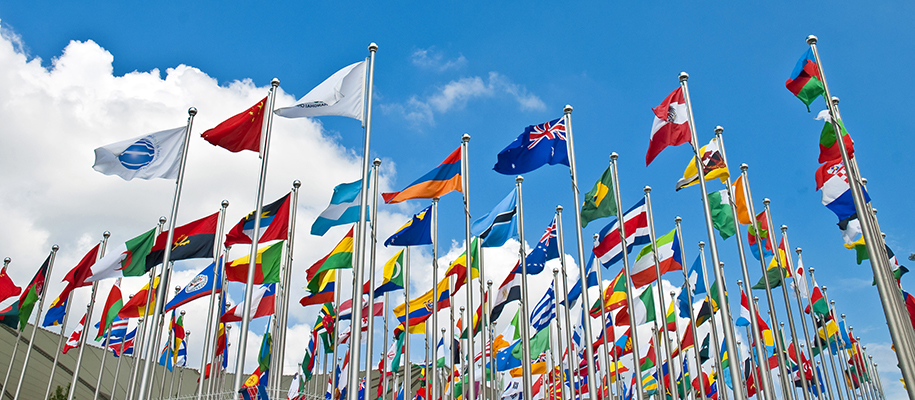
Top 7 Benefits of Joining Model United Nations in College
You may have heard of (or joined) Model UN in high school, but there are many benefits to pursuing it in college. Here are seven reasons to consider it!
by Marisa Levine Freelance Writer
Last Updated: Sep 19, 2023
Originally Posted: Oct 30, 2013
If you know your way around Model United Nations from high school, you may be able to name quite a few reasons why you’d participate in college. If you’re new to the world of Model United Nations, you may not know of any of the reasons you should! Check to see if there’s a Model UN club in existence at the schools you’re considering—or think about starting one if there isn’t! There may also be Model Arab League, Model European Union, or Model African Union available at your schools as well. Here are just a few of the benefits of why you should consider including Model UN in your college experience.
1. Boost your résumé
Employers love to see extracurricular activities; they give you more of the hands-on experiential learning you’ll need on the job. Plus, Model United Nations opens you up for great interview conversations about your experiences and what you’ve learned. Academically, it’s a perfect way to diversify. Are you a Pharmacy or Engineering major? Go outside your academic comfort zone into international relations and contribute to discussions about health or infrastructure issues. Already an international relations major ? Delve deeper into specific topic areas like nuclear disarmament.
Related: The Best College Extracurriculars to Stand Out to Future Employers
2. Keep up with the news
Since Model UN covers topics from human rights in Palestine to the potential arms race in outer space, start reading. Every day. Once you have an assignment to represent a particular country, you may want to set up Google Alerts on specific topics and regions, but you’ll also need (and want!) to know what’s generally going on in the world to fully participate in meetings and events.
3. Learn through new lenses
You aren’t representing yourself—you’re representing a foreign country on a specific topic. While you may never know exactly how the delegate from Yemen might behave in committee, researching everything from population demographics to past votes on UN resolutions to finding recent public statements helps you form an understanding of the actions of governments large and small. Plus, background knowledge helps you to think on your feet during debates.
4. Build relationships with international and multicultural people
Where else can you meet students representing Germany with British accents and southern military cadets representing Syria? Take negotiations beyond formal debate at conferences by grabbing lunch or a coffee, and you’ll end the weekend with friends from around the world and a new understanding of all sorts of cultures. With a broad range of students participating from all sorts of majors, and the chance to meet delegates from other schools and countries, Model UN is the perfect blend of intellectual and social. You’re sure to have a good time!
Related: 4 Great Ways to Make Friends at College
5. Enhance your academic and career skills
There’s nothing quite like addressing a room full of 250 people and starting with “The delegation of France feels...” Sure, your hands might be shaking, but if you take an old West Point trick and clasp them behind your back instead of clutching a trembling sheet of paper, nobody will be the wiser. But the more practice you have under pressure, the better you’ll get at it! Another skill you may pick up is rockstar event planning. Invite other schools for intercollegiate conferences. Learn the ropes of working with school event offices, outside vendors, partner organizations, and guest schools. Don’t forget about non-conference components, like dinners, travel guides, and parties!
6. Get traveling and professional experience
There are conferences all over the country—and the world. Whether you have the budget to just go across town and experience a conference at a new school or go to DC, Germany, or Russia, there are dozens of different opportunities to explore the world around you through Model UN. Invite local ambassadors and dignitaries to speak to your club privately, be the keynote speaker at a conference, or request an embassy visit in your city or a conference city. In Washington, DC, many embassies of Arab League member states will host schools traveling for the National Model Arab League conference each spring.
7. Partner with service organizations
Partner with organizations like the National Council on US and Arab Relations (NCUSAR) or United Nations Association of Greater Boston (UNAGB) to host conferences for area middle school and high school students, or help coach Model UN teams at local schools with members of your club. It’s a great way to help make sure schools can offer Model UN as an activity and engage students from a young age!
Related: 6 Important Questions About Service Learning in College, Answered
No matter how you participate in Model UN, you’ll soak up new experiences, make the most of your time on and off campus, and take advantage of all that this amazing extracurricular has to offer personally, academically, and professionally. You won’t regret it!
If you’re interested in learning about more on-campus clubs and organizations, check out our article on Exploring Extracurricular Activities in College: How to Find the Best Opportunities .
Like what you’re reading?
Join the CollegeXpress community! Create a free account and we’ll notify you about new articles, scholarship deadlines, and more.
Tags: extracurricular activities extracurriculars international relations Model UN student activities student life
← Previous Post
Next Post →
About Marisa Levine
During her five years at Northeastern University in Boston, Marisa Levine was an active member and president of the United Nations Association, an officer of NUCALLS (Northeastern University Culture and Language Learning), and a founding member of NS4G (Northeastern Students for Giving). She also attended dozens of events held by many other groups (thanks for the snacks, dance lessons, new experiences, and wonderful memories!).
Join our community of over 5 million students!
CollegeXpress has everything you need to simplify your college search, get connected to schools, and find your perfect fit.

High School Class of 2021
For a long time, I've been searching everywhere to find the perfect website I can get scholarships and information from. Needless to say, I could never find the right one. That was, until I found CollegeXpress. Through my journey of finding the right scholarships for me, I was able to find articles about different things. They've all been helpful, especially in times like this! I was even able to connect with some of my favorite colleges! I love CollegeXpress. Thank you!

Ruth Aguilar
CollegeXpress helped me by providing me with many scholarship opportunities and information about universities I want to attend. What I love about CollgeXpress is how it provides a variety of information, and as the first child attending a university next year, it has been very essential and helpful. I’m so grateful for this because the information provided by CollegeXpress has also helped me see that there are so many college opportunities, and it always informs me by email. In other words, CollegeXpress has been like a guide for me as a future college student.
Joan Franklin
I love this website and have been using it for years with my students. I originally bought products through Wintergreen Orchard House and appreciated having key facts at my fingertips when advising students. Your site is easy to access and offers a wide array of topics I need as a busy college counselor.

Hailey Riddile
CollegeXpress has helped me find scholarships to apply for and look into more colleges. While there are many websites similar to CollegeXpress, every website is different, and I've found a lot of good insight on this website. Receiving emails from CollegeXpress about scholarships is extremely useful, and getting insight about colleges near, far, and anywhere in between helps me narrow down my choices to what I want, which is also super helpful. The articles are always really good reads, and I can't stress enough how helpful this website has been to me. Anything related to college is beneficial to me as a senior, and I have learned lots of useful things to help me on my college journey this year.
High School Class of 2019
My favorite feature of CollegeXpress is the scholarship search. As someone going out of state for college, I needed all the financial help I could get, and CollegeXpress helped me easily find scholarships I could apply for to help fund my education.
Colleges You May Be Interested In
Miami University
Azusa Pacific University
University of Pittsburgh
Pittsburgh, PA
Lawrence Technological University
Southfield, MI
Wentworth Institute of Technology
Personalize your experience on CollegeXpress.
With this information, we'll display content relevant to your interests. By subscribing, you agree to receive CollegeXpress emails and to make your information available to colleges, scholarship programs, and other companies that have relevant/related offers.
Already have an account?
Log in to be directly connected to
Not a CollegeXpress user?
Don't want to register.
Provide your information below to connect with
Political Science Department
Model United Nations
The National Model United Nations conference is the largest and one of the most prestigious collegiate political simulations in the world. Last year’s conference brought together more than 5000 students from over 300 colleges and universities around the world to New York City in order to practice international diplomacy across a wide variety of topics. Covering issues ranging from international security and the environment to gender rights and economic development, students are asked to research and advocate the policies of their selected country in an environment intended to mimic real international diplomacy as closely as possible. The result is one of the most unique and challenging academic programs a student may experience as they develop research, writing, public speaking and group cooperation skills.
Union College has attended the conference for the last three years and has established itself as an active and respected participant. While many schools attend as a club or more informal group, Union’s establishment of the Model UN as a class has allowed us to create a more dedicated and academically rigorous approach to the conference. We believe this approach creates more enthusiastic and better prepared delegates, a belief supported by our receipt of eight awards over our last three years of competition. Beginning with a competitive petition process for entry into the class, students are guided through an expanded research program coupled with a focus on their ability to publicly present their work in a concise manner. The result has been the establishment of an already strong tradition of excellence at the conference, and a unique and truly rewarding challenge to the students of Union College.
Student quotes
“The Model UN gives students the opportunity to see how politics works on a level far superior to what a classroom setting can provide – instead of reading about politics in a textbook, students can actually experience it for themselves” – Lea Tessitore (’11)
“Model UN challenges even the brightest and most confident students in a way that no exam or written assignment ever could. Most importantly it broadens your world view, exposing you to new cultures and concepts beyond the traditional confines of the classroom. I would recommend it to anyone, regardless of major or past interest!” – Katherine Murphy (’10)
“I can say that the Model UN was the single most rewarding academic experience I had at Union. I can’t remember another course or project that pushed me to work as hard as I did for Model UN and provided so much in terms of a return on my investment of time and effort.” -Cam Berjoan (’10)
“Model UN was undoubtedly one of the most productive, engaging, and enjoyable things I did during my four years at Union College. In fact, the Model UN program was one of the main reasons why I decided to pursue a post-graduate degree in global politics, ultimately focusing on some of the issues we considered in class.” – Sean Mulkerne (’09)
807 Union Street Schenectady, NY 12308 © 2024 Trustees of Union College · Student consumer information · Website privacy policy

IMAGES
VIDEO
COMMENTS
College application essays and the personal statement are opportunities to write about meaningful experiences. Not every high school student who does MUN should write about it.
As a current high school senior, Model United Nations was a huge component of my college applications. Here are some of the ways MUN helped me through many of the factors of applying to college. 1. The College Essay. For most competitive universities, a personal essay is a required portion of an application.
The title of my essay was "Finding My Voice.". Drawing from my experience, here are 3 tips for using Model United Nations to get into college: 1. Demonstrate leadership by winning awards, chairing committees, running conferences, and training your club. Admissions officers are looking for examples of leadership.
In Model UN, you act as a country representative in the United Nations, dealing with real problems like climate change, human rights, and international conflicts. This experience teaches you to think methodically, consider various perspectives, and negotiate with others to find common ground. These simulations boost your confidence in handling ...
Model UN provides the opportunity to learn more about international relations through education, collaboration, and simulated UN sessions.
Model United Nations, often referred to as Model UN or MUN, is an extracurricular most commonly for high school students, but also available to college and middle school students.
using Model UN paper? so I'm applying to Georgetown SFS, and I'm using a large portion of a Model UN policy paper I wrote a few years ago; I'm pretty sure I turned it in that paper through Huxley or some other online submitting platform. I'm concerned that if I take chunks of my work and use it in my supplemental, it'll get flagged for ...
Model UN helps students get into college. Model UN provides students with the learning and leadership experiences that admissions officers look for. The depth of these experiences serves as possible material for personal essays and interviews. Model UN is also an extensive network of alumni at top colleges.
Past the common app essay on MUN that we may have written to get into our dream school, the skills we learn in Model United Nations can help us succeed and grow in college as well. 1. Negotiation and collaboration skills: Like in high school, many classes in college require group projects and assignments. Just like organizing a group chat or a ...
What is Model UN, why should you participate, and how can it help prepare you for college? Find all the answers to these questions and more now!
MUN position paper is a key part of getting ready for a MUN conference. Learn how to write an amazing modern united nations position paper.
In Model UN, I'm thankful to have found the experience, help, and inspiration that helped me through the college application process. I reflected on my role as a Secretary-General leading a 200+ person program that had seen 5 different advisors in 3 years.
Manage the college essay writing process. Livestreams. Resources. Grade Guides Know what to focus on each year. Checklists & Guides Step-by-step manuals for success. ... Model UN: Ideal Extracurricular for the Future International Relations Major. Extracurricular Activities 7 min read.
Read an admission essay sample, "Model United Nations: Shaping My Character and College Success", with 677 words. Get ideas for your college application essay.
Strong Narrative: This essay has a compelling story, starting from this author's early struggles with public speaking and developing into their later successes with Model UN. Using a central theme—in this case public speaking—is an effective way of creating a cohesive essay.
Looking into doing Model UN and my mom said it looks good on applications too. I wanted to know how good it looks on applications. Thank you!
Fund For Women at NAIMUN Model United Nations conference in Washington, D.C. last year, I was transfixed by a Nigerian woman discussing women serving in government. She echoed my passion for enhancing educational opportunities as the cornerstone for advancement for all. But the extraordinary surprise was yet to come! Ban Ki-Moon spoke slowly in his clear Korean accent to the 200 of us selected ...
You may have heard of (or joined) Model UN in high school, but there are many benefits to pursuing it in college. Here are seven reasons to consider it!
College admissions officers look for examples of leadership in college applications, essays, and interviews. Model UN offers many opportunities to show leadership — here are 5 ways: Win Awards. Every moment in committee is an opportunity to show leadership. Whether it's making speeches, building alliances, or debating resolutions, you are ...
The Model United Nations is a series of programs run throughout the country and the world with the goals of furthering understanding about the United Nations, educating participants about world issues and promoting peace and the work of the United Nations through cooperation and diplomacy. The value of the Model UN experience for a student is based on what benefits a student can gain from ...
Welcome to the Model UN Ultimate Guide! We'll teach you the essentials of committee preparation, time management, and negotiation that will get you ready for your next conference.
Model United Nations. The National Model United Nations conference is the largest and one of the most prestigious collegiate political simulations in the world. Last year's conference brought together more than 5000 students from over 300 colleges and universities around the world to New York City in order to practice international diplomacy ...
Model UN has helped us grow into leaders, discover our futures, become confident in ourselves, and form lasting friendships with people from all over the world. This article was written by you, the Best Delegate community, and it shows stories about how MUN has made us the people we are today. While these are only a small number of the ...